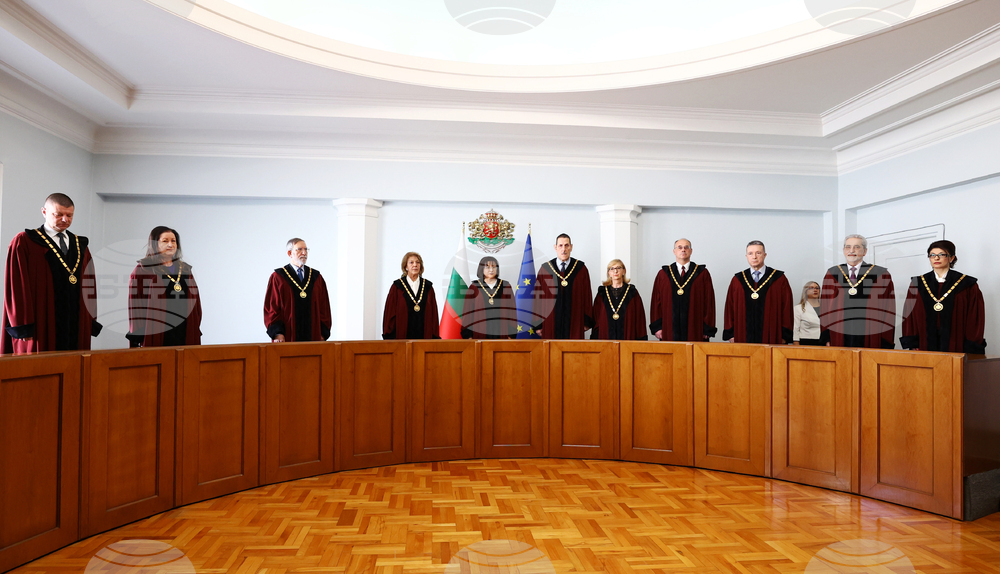site.btaUPDATED Most Constitutional Amendments on Judiciary Declared Invalid


Bulgaria's Constitutional Court on Friday declared unconstitutional as "invalid" part of amendments to the country’s basic law passed on December 20, 2023, it transpired from a 200-plus-page-long decision published on the Court’s website.
Reasoning its decision, the Court largely argued that such amendments to the Constitution can only be introduced by a Grand National Assembly.
Because of a split 6-6 vote, the constitutional judges were unable to rule on three revisions: the options for the appointment of a caretaker prime minister limited to ten senior office holders, the continuance of Parliament’s life while a caretaker cabinet is in office, and the scrapping of Bulgarian citizenship only as an eligibility requirement for MPs subject to 18 months' residence qualifications. The petitioners' requests were thus set aside and these new provisions were left standing, but they may be challenged again before the Court.
Friday's decision found invalid all constitutional revisions that replaced the existing Supreme Judicial Council (SJC) with a separate Supreme Judicial Council and Supreme Prosecutorial Council. This reform was prompted by the need to increase judges' independence and enhance the accountability of prosecutors and investigating magistrates. The ineligibility for membership in the two councils of holders of a position of prosecutor or investigating magistrate at the time of the election was also invalidated. The reinstated SJC will revert to its five-year term, instead of four years under the December 2024 revisions. Again, the SJC Plenum will be empowered to elect a prosecutor general rather than the Supreme Prosecutorial Council, and the chief prosecutor will be in office for seven instead of five years. He or she will be reinvested with the power to exercise supervision as to legality and provide methodological guidance regarding the work of all prosecutors and to approach the Constitutional Court without restriction. An amendment that was left standing curtails prosecutorial powers outside criminal procedure to contesting unlawful instruments before the court where so provided for in a law.
A significant amending clause that was found to be consistent with the Constitution provides for an ad hoc prosecutor to investigate a publicly prosecutable offence committed by the Prosecutor General or a deputy prosecutor general.
The Constitutional Court concurred with a provision of the revisions according to which the structure of the prosecution service must correspond to the structure of the courts examining criminal cases, which entails a closure of the Supreme Administrative Prosecution Office.
A claim that the possibility of each court to approach the Constitutional Court with a petition to establish an inconsistency of a law applicable to the case at issue with the Constitution is unconstitutional was rejected.
Under a provision declared unconstitutional on Friday, the Inspector General and the inspectors at the SJC Inspectorate were barred from holding office as a judge, prosecutor and investigating magistrate in the course of two years after completing their term of office.
A new rule, requiring a two-thirds majority vote for the election by the National Assembly of members of bodies of whom all or part are elected by Parliament, was also found incompatible with the Constitution.
The Constitutional Court expressly stated that the legal consequences produced while the revisions in the constitutional provisions concerned were in operation retain their legal effects. The decision does not open a legal void as the amendments that will no longer apply will be superseded by their previous versions.
Constitutional Case No. 1/2024, on which the Court issued a decision on Friday, was instituted on two petitions.
One petition was submitted on January 8, 2024 by President Rumen Radev, who argued for unconstitutionality of the abolition of the president's power to dissolve the National Assembly if it is incapable of rendering up a government, the eligibility of dual nationals for MPs and government ministers, the limited options for the appointment of a caretaker prime minister, the curtailment of the caretaker cabinet's powers to organizing free and fair elections, the provision that the presidents of the two supreme courts and the prosecutor general will be presumed appointed or dismissed if the head of State fails to issue a decree on any such proposal within seven days, and the empowerment of Parliament to introduce, at its discretion, a qualified majority for the election of particular regulatory authorities.
The other petition was submitted on January 11, 2024 by 48 MPs of Vazrazhdane and There Is Such a People in the 49th National Assembly, who argued that the amending law was unconstitutional in its entirety as a large part of the revisions fall within the competence of a Grand National Assembly, including the curtailment of the prosecutor general's powers, the change of the prosecutor general's term of office and the manner of appointment of the two supreme courts' presidents and the prosecutor general. The MPs also asserted that Parliament breached the established procedure for the adoption of the constitutional amendments.
/NF/
news.modal.header
news.modal.text